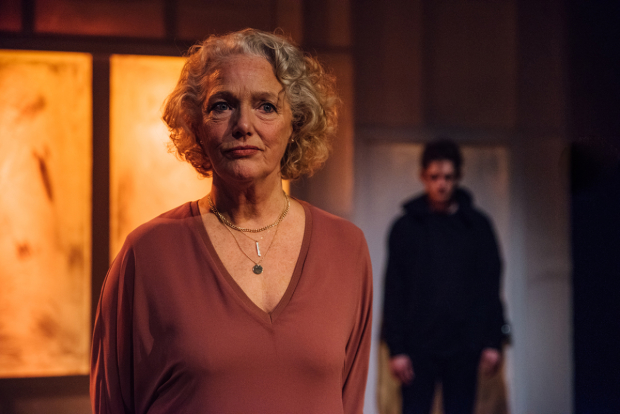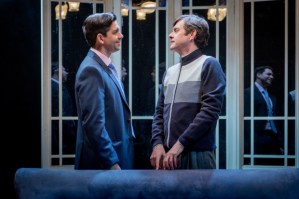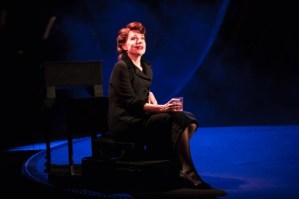Review: Vincent River (Park Theatre)
Louise Jameson stars in this revival of Philip Ridley’s play

© David Monteith Hodge
One longs for a day when Vincent River doesn’t feel timely. At the heart of Philip Ridley’s two-hander is a brutal homophobic attack; one that leaves a teenager dead in a disused railway station. Last year’s Stonewall survey reported a creeping rise in homophobic hate crimes. In the wake of the Brexit vote, such assaults more than doubled.
First seen 18 years ago, Vincent River is a kind of haunting. A teenage boy with a black eye to go with his black clothes turns up at a grieving mother’s new flat. Davey’s been stalking Anita for days from afar. She’s spotted him, the boy who discovered her son’s dead body, but kept her distance. When he turns up on her doorstep, it’s immediately clear that all’s not what it seems.
What it is, however, shouldn’t be clear at all and the dynamic between these unlikely drinking companions – sometimes menacing, sometimes maternal, sometimes strangely sexual – is a riddlesome, shifting thing. Disgust runs in both directions, but so does distress and, though not without its contrivances, Ridley allows their emotions to entangle. It’s like Harold Pinter’s attempt at young adult fiction.
However, Robert Chevara’s revival is emphatic where it needs to be enigmatic. You know, almost immediately, exactly what Davey’s doing there, and Thomas Mahy never really mines the menace of a young man who might be capable of murder, or might just be searching for a surrogate mother. His steadfast sullenness gives Louise Jameson too little to bounce off, but she portrays a mother struggling to reconcile grief for her son with revulsion for his sexuality.
Shoreditch has changed since Ridley’s heyday. The disused station is still standing – sold for £665,000 in 2011, but as yet undeveloped – but it’s not the wasteland it once was. Boxpark’s just down the road, the Cereal Killer Café’s round the corner. It makes Vincent River a period piece, but Chevara never quite finds its place: both old-school East End and not. Mahy talks with a south London twang, too much 'and ting,' while Jameson’s alcoholic takes Fever Tree tonic with her gin. It smacks of a lack of considered detail. It runs throughout Nicolai Hart Hansen’s design: always a stage, never a room.
Marty Langhorne’s lighting, a slow fade to streetlight, bright white to burnt orange, strains for atmosphere, but it's battling against a bare-minimum set: paper thin walls and a cheap white sofa. There’s enough for the stage directions, but not a scrap more and it maroons Ridley’s characters.
All Chevara can do is turn them into storytellers and, while Ridley’s writing glistens in high-definition – bottles smashing like fireworks, blood-smattered urinals – it breaks the riddle of the relationship in the room itself. That’s where Vincent River‘s real power lies – in the dance between a motherless son and a mother missing her son; between homophobe and homosexual and two lost lonely souls in a harsh, horrible city.
Vincent River runs at Park Theatre until 14 April.
















